
*
Kevin Kline has carved out a career playing lovable weirdos and loony eccentrics, from the psychologically scarred (Nathan in "Sophie's Choice"), to the criminally insane (Otto West in "A Fish Called Wanda"), to the philandering and titanically self-absorbed (Joey Boca in "I Love You to Death") to the laconically offbeat (Howard Brackett in "In and Out"). Still, perhaps none of Kline's roles has been as wildly, aggressively idiosyncratic as Henry Harrison, the character that the Oscar-winning actor brings to sparkling life in his new film, "The Extra Man," which opens in New York City July 30 prior to a nationwide launch.
Based on the comic novel by Brooklyn writer Jonathan Ames, "The Extra Man" renders Henry as one of those quintessentially New York characters that Manhattanites seem so familiar with — charming and likable despite an air of faux sophistication and a propensity for grand pronouncements. While he has no obvious employment or easily discernible source of income (and tools around town in a dilapidated Buick), Henry manages to live the life of a man of far greater means — sneaking into the opera, wrangling invites to posh parties, and wintering in South Florida. A failed playwright, the stentorian-voiced Henry serves as "an extra man" (or "an essential man" as he prefers to call himself), escorting wealthy dowagers to society events and parties and keeping them company.
"In a way, Henry is living an illusory sort of life, playing a role of a man who's part of the haute noblesse of New York City. But he's living in destitute-like, squalid conditions. There's an element of performance to his life," Kline said during a recent press event in Manhattan while promoting "The Extra Man," which is directed by Robert Pulcini and Shari Springer Berman ("American Splendor").
Henry, of course, has more quirks than the most peculiar character in a Wes Anderson film. He uses a marker to color in his ankles when he runs out of clean socks; he urinates clandestinely in public while standing in his trench-coat between parked cars; and he rubs a small dog all over himself to try to transfer the fleas he's been told he's infested with. When he takes in a young man, Louis Ives (Paul Dano), as a border in his cramped apartment, the two bond as a couple of kindred outsider spirits. A recent New York transplant and a bit of a wayward soul, Louis could be viewed as a more reticent and shyly eccentric version of Henry, with a desire to dress in women's clothes and aspirations to become the next F. Scott Fitzgerald. "Both of them have these artistic temperaments," said Kline. "And Louis' experimentations are probably driven by a need to understand himself deeply. He's searching for his identity more assiduously than a mere mortal might search. So he's out there. I think it's because he wants to be an artist or has an artistic temperament, like Henry."
While Louis becomes an accidental protégé to Henry, Kline said that he has never experienced a mentor-protégé relationship with a young actor before. However, he did encounter what he calls "mentor-ish" figures early on in his own career. "I have had strong men under whose wings I was taken," he admitted. While most of these men were stylistically worlds apart from Henry, what they did share was a larger-than-life stature and a dynamic ability to attract others to them and mold people to their way of thinking.
The first was John Houseman, his (and Patti LuPone's) former instructor at the Juilliard School's Drama Division in the early 1970s, who formed Kline and his first graduating class at Juilliard into a seminal touring repertory company. "He was a sort of mentor in that his philosophy governed the whole way of the Juilliard School," said Kline.
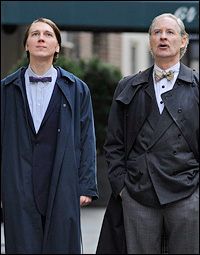 |
||
| Paul Dano and Kevin Kline in "The Extra Man" |
||
| photo courtesy Magnolia Pictures |
Still, Kline is unsure whether the character is grotesquely self-delusional, or if in fact he's truly self-aware. "I mean, you could say he's a big phony, but I don't think he is. There's something in his essential spirit that is very true to himself. There's certainly a degree or inventiveness and invention and self-delusion, but it's to survive...He doesn't see windmills; he sees giants that have to be conquered. He has this poetic imaginative streak...I don't know if he's redefined himself, or if he's just stayed true to who he is, in spite of the fact that his circumstances have changed. But is it a willful self-delusion? I think he's also very realistic. He knows he's living in these conditions, and he knows that there's something parasitic about his existence, in a way. But he has refined it into an art. He's made himself not supplementary, not extraneous or extra, but in fact crucial, essential to any social gathering of any intellectual weight. He's like great characters in literature who are improvising, who are making what they can out of what comes their way, but doing it with panache and style and extravagance — whether it's living utterly above your means or what have you."
For a 62-year-old guy who's played his fair share of narcissistic jerks and loud-mouthed lunatics, the St. Louis-born Kline is surprisingly soft-spoken and initially reticent in person — slow to come out of his shell. But before long, this born performer, who's dressed casually in a bright green polo shirt and dark pants with cropped salt-and-pepper hair, displays flashes of his robust intellect and sharp wit — offering up funny anecdotes, silly vocal imitations, and pithy one-liners.
During the casting process, the filmmakers immediately zeroed in on Kline to play Henry. Because of the character's outsized personality, they wanted someone with an equally commanding presence on screen. Still, they were concerned because they'd heard that Kline had earned a reputation for turning down so many roles, his nickname in Hollywood has become "Kevin De-Kline."
The actor, however, scoffs at such a characterization, while acknowledging that he remains discerning about what parts and films he chooses to work on. "Somehow I got that reputation. And my middle initial is D!" he said, with a good-natured laugh. "But you can't do every script that's offered. And I don't know if I'm more or less choosy. I just do what I like and what I think I'll find stimulating and/or fun or be challenged by it in a way that if I fail, I'll fail beautifully. I really don't know what my criteria are."
So have the quality of scripts that Kline has been offered taken a tumble in recent years?
"They go up and down, and you never know what's going to come across your desk. I mean, with some scripts, you'll read two pages, and it's just unspeakable," he said, tossing his hand over his shoulder in mock rejection. Despite the filmmakers fear that Kline would turn them down, he launched himself into the role with gusto. "I was just dying to do it," he said. "I was just so tickled by the script."
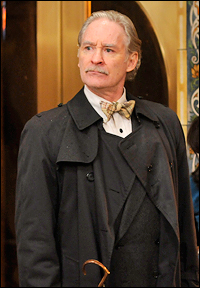 |
||
| Kline in "The Extra Man" |
||
| photo courtesy Magnolia Pictures |
Both Berman and Dano insist that Kline was the consummate professional. While Dano had worked with Kline before on the 2002 film "The Emperor's Club," in which he played one of Kline's pupils, he said he didn't really get to know the actor until prepping for "The Extra Man." "We hung out a bunch before doing the film, and I think it was good that we got to know each other," Dano says. "He's such a spontaneous and alive actor. And he's not afraid to try things and put himself out there. I had so much fun working with him. He's hilarious."
Did the duo end up fostering the same kind of mentor-protege relationship that Henry and Louis develop in the film? "I'm still young, but I feel like more of an adult. So, you know, Kevin is now like a friend to me, when before [on "The Emperor's Club"] he would have felt more like a parent, or something like that. So it's totally different," he said. "You do feel a little safer. It's nice to have a connection with the other person. It's just a jumping off point. But this film was totally different, totally new. We didn't keep in touch before. But now we're buddies."
While the versatile Kline has shockingly only scored one Oscar over the course of his stellar career (for "A Fish Called Wanda" in 1989), he's been a magnetic presence on the big screen throughout the past three decades — from his breakthrough years as a screen actor in the 1980s ("Sophie's Choice," "The Big Chill"), through his '90s high points ("Dave," "The Ice Storm" and "In & Out"), and his recent tour-de-force performances in the aughts (as composer Cole Porter in "De-Lovely" and a dying, regretful father in "Life as a House"). He has two new films in the hopper that are due out in the next year, Robert Redford's "The Conspirator," in which he plays Lincoln's Secretary of War, Edwin Stanton, and a new untitled Ivan Reitman film co-starring Natalie Portman and Ashton Kutcher.
Kline discusses his role in "The Extra Man" in this interview:
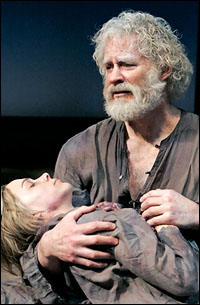 |
||
| Kristen Bush and Kevin Kline in King Lear | ||
| photo by Michal Daniel |
"Before dying?" he jokes.
Is there any chance we'll ever see the actor in a Broadway musical again?
"The problem with Broadway musicals is they're so expensive — unless you're doing Urinetown or something Off-Off-Broadway," he said. "They're so big, and they need a year's commitment, and it better be a great musical, because that's eight shows a week for a year. Whereas, you can do Hamlet for 12 weeks at the Public Theater or King Lear — or Cyrano. Cyrano was really an unusual thing for Broadway. A limited 12-week run of a classic play with 30-plus people in the cast. That's very expensive. But the backers actually got their money back. That's a rare thing. So it's unlikely you'll see me in a musical on Broadway."
As the actor got up to leave, he left us with one choice nugget, but declined to offer any specifics: "I'm sure I'll do something else on stage soon...In fact, there's something — a play — that I'm considering doing this season. On Broadway!" ***
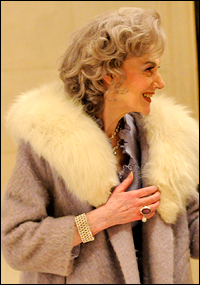 |
||
| Marian Seldes in "The Extra Man" |
||
| photo courtesy Magnolia Pictures |
"I really like actors that come from the stage," said Berman. "I really feel like it completes you as an actor to have spent time on stage. And I really do look for theatre-trained actors. It's weird, I don't even have to know it. I feel like I can tell it, too. When you audition an actor, I think you can sense whether they've done theatre or not. So you know, I definitely lean towards New York stage-trained actors."
So what's next for husband-and-wife duo? While the couple got their start in documentaries and used non-fiction elements in their indie hit, "American Splendor," about comic book artist Harvey Pekar, they're currently shooting a narrative film about the making of another very famous documentary — the landmark early 1970s PBS series, "An American Family," which has been dubbed the very first reality TV show ever filmed, centered on the Loud family of Santa Barbara, CA. The film, titled "Cinema Verite," stars Diane Lane, Tim Robbins and James Gandolfini.
***
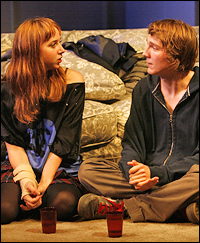 |
||
| Zoe Kazan and Paul Dano in Things We Want |
||
| photo by Carol Rosegg |
Yet Dano said that he's eager to return to the stage, while also acknowledging the emotional and physical strains of doing eight shows a week.
"I'm potentially doing something soon, I think. I want to," Dano said. "It's just that it's a big commitment. Theatre is hard, you know. So I just want it to be something I feel really strongly about — because you kind of have to go to battle every night. You know, you really got to want to kill. You gotta feel fierce about it."
Does Dano ever get butterflies or stage fright while performing on stage in a play or with his rock band, Mook?
"I get really excited before I go on stage," Dano said. "Usually it's a good nervous. I mean, you feel like you have to pee — you really do. Or you might even feel a little sick to the stomach. But usually, it's a good thing. It means that you're going to put yourself out there. It means you feel like what you're doing is a little bit dangerous, and you might fail. I think it just makes you go harder. Then once you're out there in front of people, it's a blast. It's a rush. It's a thrill."
While Dano met Kazan acting in Things We Want, they also wrapped filming last fall on a new film, "Meek's Crossing," by maverick indie director Kelly Reichardt, who made the minimalist yet moving films "Old Joy" and "Wendy and Lucy," the latter with Michelle Williams. "Meek's Crossing," set in the mid-1800s, centers on a group of pioneers whose lives are threatened as they cross the Oregon Trail. The small-budget shoot, said Dano, was much more treacherous than he first expected.
"It was probably the hardest shoot I've ever been on," he said. "We were out in the real locations in the desert of western Oregon, and it was brutal. It was just brutal. People were getting heat-stroke one day and then frostbite the next. We had to shut down for hypothermia. Like, crazy 'Fitzcarraldo'-type of shit was going on. But in retrospect, it was awesome, and I think it could be a really good film."
"Extra Man" featurette with Paul Dano, Robert Pulcini and Shari Springer Berman:
(Christopher Wallenberg is a Brooklyn-based freelance theatre and film journalist and frequent contributor to The Boston Globe, Playbill, American Theatre magazine and the Christian Science Monitor.)









